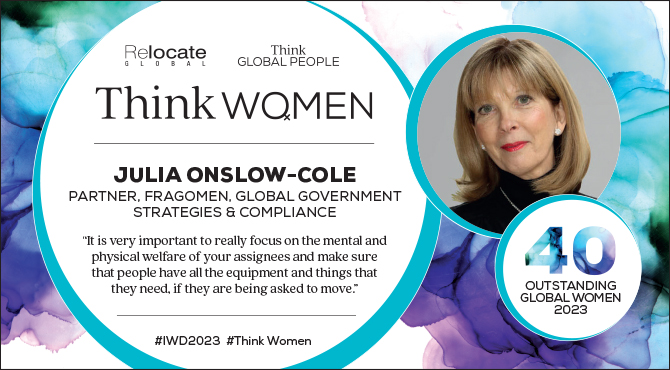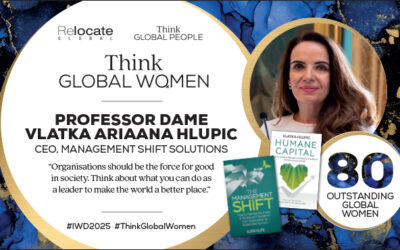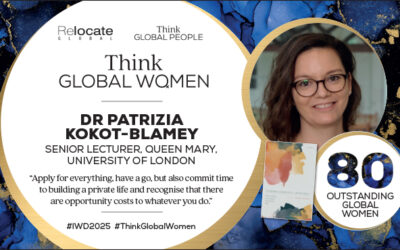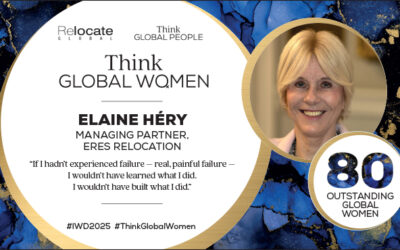Julia Onslow-Cole | 40 Outstanding Global Women 2023

Sharing highs and lows leads to success
“It is very important for that reason to really focus on the mental and physical welfare of your assignees and make sure that people have all the equipment and things that they need if they are being asked to move.”
Julia Onslow-Cole, Fragomen
Increasing geopolitical tensions around the world and a complex landscape around the issue of immigration and work permits mean that Julia Onslow-Cole’s expertise in law and international agreements is highly sought-after.
Julia is a partner at Fragomen focusing on global government strategies and compliance and was previously head of global immigration at PwC before joining Fragomen five years ago.
She has extensive knowledge of international law and has just been appointed chair of the London Chamber of Commerce and Industry (LCCI) board, the first woman to hold such a prestigious position. In addition, Julia sits on the board of directors of the International Chamber of Dubai.
In her role at Fragomen, Julia provides expertise on migration issues and policy. She has a wide range of experience advising governments, businesses and entrepreneurs and high-net-worth individuals on complex international migration. She is a specialist on global mobility and crisis management in immigration policy.
In her previous role she was a partner, legal markets leader and head of global immigration at PwC. Her areas of expertise include strategic global immigration advice. She has worked with governments on visa processing systems, residency legislation, communications and citizenship by investment programmes. She liaised with the UK government and business on Brexit and has given expert evidence at the European Parliament.
Managing complexity
Julia was recognised in the area of immigration law in the 2023 edition of ‘The Best Lawyers in the United Kingdom™’. She was also named a 2023 “Lawyer of the Year” for London immigration law. Julia is the chair of the International Bar Association’s Human Rights Institute Charitable Trust and is on the board of Breaking Barriers.
A very complex immigration landscape
“I advise governments and clients about global immigration issues and I would say that the landscape in which governments and businesses are operating has never been so complex,” she explains.
She describes the outlook as very uncertain, with geopolitical tensions rising around the world with the pandemic, the war in Ukraine and supply chain issues in China.
“The last few years have brought a lot of different shocks and challenges for businesses, governments and individuals, and therefore the legal support that is needed is much more strategic. There is renewed tension between East and West because of the war in Ukraine, tension between the US and China, and the rise of the middle powers like Saudi Arabia and Turkey.
“We are in a more unstable environment than we have been for a long period of time, where sudden change wouldn’t really surprise anyone.”
While business travel is starting to return, although not to 2019 levels, she says there is ongoing concern about the impact on the environment about travels and some uncertainty among assignees about working abroad.
“As a result of the pandemic people are more hesitant about taking assignments,” she explains. “During the pandemic, we have many cases where people were separated from their families. This means people may be more reluctant to take on assignments. Therefore, looking after your assignees’ welfare is really important.
A big leap from working from home to working in a new country
“With the advent of hybrid and remote working, people sometimes have less experience and less confidence about taking on projects, especially younger people who maybe have finished their university studies just working from home and started a job working remotely. Then it is quite a big undertaking for those same people to go on an assignment overseas, whereas maybe pre-pandemic that wasn’t such a leap. So I think that has introduced an area of complexity into the whole picture. It is very important for that reason to really focus on the mental and physical welfare of your assignees and make sure that people have all the equipment and things that they need, if they are being asked to move.”
Whole family welfare is the key to a successful international assignment
This might include having more cultural support, something which some companies have cut back on in order to save costs. Another option is to offer more flexible packages to assignees.
Julia is on the board of the Permits Foundation, which lobbies for the rights of partners to get automatic work rights in different countries. She passionately believes that that is important, because it is very isolating for partners if they move but are unable to work.
“It can be very isolating and in some countries partners are not even allowed to do charity work,” she says. “When you look at the success of the assignments, you often find it has failed because the partner is not very happy.”
She says that creating a more equitable workplace will require a cultural shift. Britain is still well behind countries like Sweden where parents share childcare responsibilities and are entitled to greater parental leave.
Good Leadership is being honest with experiences
She describes her leadership skills as collaborative in style and enjoys working as a team and training, development and teaching.
“As you progress in your career you have a lot of experiences to share, I believe it’s important to share the highs and lows. Otherwise, you can inadvertently create a misleading impression. The important thing is for people to have confidence to try new things and learn by their mistakes. In my view, this is the pathway to success.”













